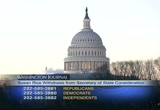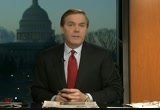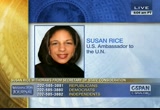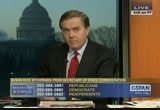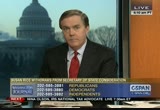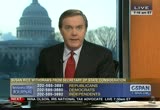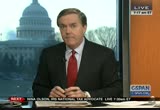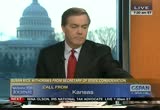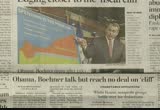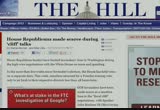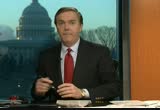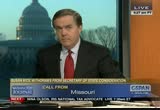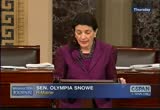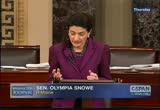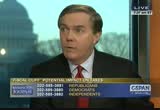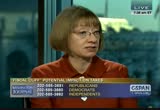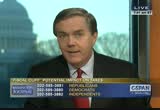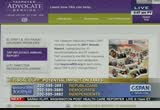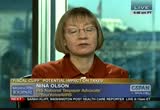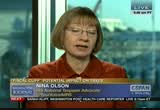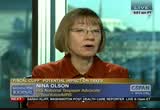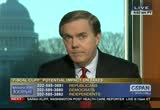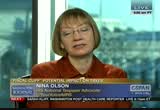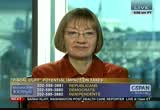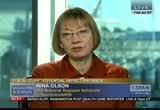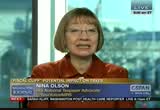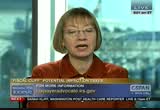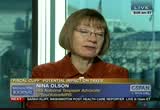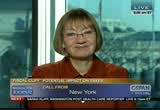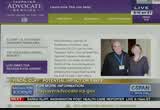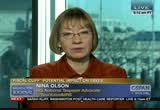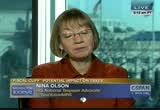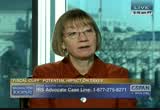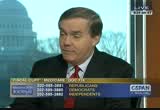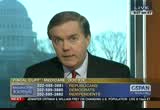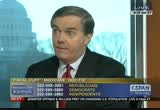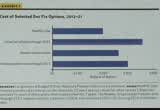tv Washington Journal CSPAN December 14, 2012 7:00am-9:00am EST
7:00 am
>> today i made the decision it was the best thing for our country that i not continue to be considered by the president as nomination for the secretary of state because i did not want to say a nomination process that was very prolonged, politicized, and distracting. host: in an interview last night with a brian williams, susan rice discusses what she withdrew her name for consideration for secretary of state. the washington politics behind
7:01 am
her decision. later today, she will have a face to face meeting with the president. the focus has turned to john kerry. the hill will be relatively quiet today. the house and senate not in session. john boehner is back in his ohio congressional district. they did meet last night for about 50 minutes. it is friday, december 14. we are going to begin with your calls and our focus on ambassador susan rice. her decision to take her name out of consideration. what does this tell you about washington politics?
7:02 am
7:03 am
here is more from the interview that aired last night. [video clip] >> there was one piece of what i said that turned out to be wrong. there was not a demonstration. what i said was, there were extremists who came to our facility with heavy weapons. i indicated when asked if they could be al qaeda or allocated affiliates or libyan affiliates. and then they attacked and a
7:04 am
violent fashion. host: on the front page this morning. let's get to your phone calls and your reaction and what this means for the president or secretary of state hillary clinton and her successor. on the republican line, good morning carlo. caller: thank you for taking my call. i think it is that what has happened to politics today. susan rice made comments. she was on five major networks taking a story supposedly given
7:05 am
to her from intelligence that the video has caused the attacks. we know that is incorrect. the bottom line is, people were killed. they had seven hours to get the people out of libya and we did not send help. the president said that they should come after him if they did not like what was going on. we should. people were being killed. if she had nothing to do with libya, what was she doing on the five news stations? i think they covered it up, and they need hillary clinton and congress to tell what happened. i think the republicans, john mccain and the others that were in conference with susan rice were confused about her stories about what was told.
7:06 am
they need to tell the truth and stop covering and up. they pushed it on the back burner after the election. i think that is sad and scary what is happening today with the administration. the general public is not aware of what is going on. i watched c-span all of the time. i watch was coming out of the administration's mouth. i am aware and i know what is going on. i think we are in a very scary time. host: thank you for the call from ohio on the republican line. "the washington examiner"has more on when this is going next.
7:07 am
he is best liked among the two senate members including john mccain who also was a party nominee and also lost in his bid for the white house. carol is joining us from ohio. caller: i have to disagree with the lady from ohio. they have the vilified in this poor lady. it is all political. it is all part of the republican "do not let the president have any kind of good
7:08 am
things happen." they will stop everything. i have voted republican in my history of voting. i do not think i will ever vote again until they go back to where i was a in the 1960's and 1950's. i cannot fathom why the republican party has changed so much. i know it is the tea party and newt gingrich. they have made the republican party a nonstarter for a lot of us who were moderates. i do not think there is anybody enter the republican party i would vote for. host: this is from "the washington post." this morning inside the new york
7:09 am
7:10 am
from last month where she received a round of applause. anita is on the phone from florida. good morning on the independent line. caller: good morning. i am very, very disappointed. i thought finally they were talking like they were going to start working together. both the democrats and republicans. you can still tell a are just beating up on the other side. as i listen to the women who just spoke, i do not understand why we do not make the agenda what is good for america? why do we still have to have an agenda of polarization of the two parties? they are not going to leave us
7:11 am
and the choice except independence are going to have to come up with a third party one of these days that is moderate and has america first. host: who do you think on the political landscape today would be the best leader? caller: i do not know. i am a very politically savvy person. i get involved. right now, i cannot tell you. it is too much of a polarized world. let's see what they end up doing about the tax situation to get an idea of whether they are going to work together or whether they want to kill the other side and let america go down the tubes. host: from "the new york post."
7:12 am
richard is on the phone on the republican line. caller: good morning. this lady here, she is bowling out because she is told what to do. there is no such thing as being nice. where really irritates me is that if you are black, the first thing the democrats hauler is that it is racism. if that were the other side, if it were the republicans the would have gone crazy. it is just like with the voter i.d. lost. we are too stupid to get an id. -- id laws. i cannot handle it anymore. it is aggravating. host: thank you for the call. gary on the twitter page --
7:13 am
you can also join us on facebook or e-mail. politico has the story. rice's decision pre-empts what was to be an intense confirmation battle. perhaps big-ticket agenda items along with it. that is a relief to some inside who wondered about preserving political capital for fights over the budget and immigration reform. next is bob from new york city. caller: thank you.
7:14 am
i can read your transparent republican leanings, but god bless you, you are entitled to them. host: i do not know how you can read that, but go ahead. caller: this is a very interesting political domino going on with susan arise. it is leading possibly to kerry or scott brown, your man in massachusetts that lost. you know, if i were president obama, i would look to play this game of chess differently. i do not know if i would look to an joe lieberman or somebody completely unexpected. i would keep john kerry out of it and i would play the
7:15 am
political game of chess that is being forced imam the president. i would like to say -- i agree with the former callers and really the woman from florida talking about how we should not be rigid we should be making decisions about what is best for america. i would like to finish and say this deficit and debt is all about health care costs. mostly the costs are humongous. they are not micromanaging and looking at health care costs and ways to bring down health-care costs. i believe including opening up medicare to younker buyers, people that can buy and, who never use my health care
7:16 am
costing $6,000 a fourier and i have not used it for 20 years. host: thank you for the call. this from "to the new york times. are [video clip] >> susan will continue to be an outstanding u.s. ambassador to the united nations. i have not made a decision about who would be my next secretary of state. there is no doubt susan was qualified. her interest is serving the country. she has done an outstanding job and i could not be prouder of her. she will continue to be a top member of my national security team.
7:17 am
host: one of the series of interviews the president did yesterday. the president praised the work done by susan rice. from the facebook page -- the announcement that susan rice will not keep her name in consideration. she was seen as the leading contender to replace secretary of state hillary clinton. mike is on the phone from
7:18 am
atlanta. caller: i want to give reference to the hypocrisy in our society. there are talking about misses rice and giving a misrepresentation. i want to remind america about mr. pat tillman and how they gave him the congressional medal of honor and there had to be a lot more people that knew about that. it was documented with the female captured a that was not in comment -- combat, she was driving the supply duty. they put this up to america as if it was some kind of operation they were doing. it is a shame that we will not admit to ourselves a life was lost with our ambassador and other people they're trying to make the world a better place. we will -- we do not want to see
7:19 am
that as america. anyone old enough to know anything about politics, when the rules were changed, and there are still those who stand guard by what they call old school, take our country back. our country was not good at that period of time because it did not include everyone. it goes beyond color and race now. it is called inclusive. that is how president obama became president. it took a group of all individuals to put that man into office. caller: thank you for the call. i want to go back to another opinion post. he writes --
7:20 am
7:21 am
bridge to sell you. this cover up was so obvious from the beginning. i think the intelligence committee and miss rice were used as scapegoats. if she has a beef is with the president. just quit insulting the intelligence of us that are in the conservative movement. we are not democrats. we cannot be insulted that easily. this is a political decision made by the white house because they are in a campaign. if people want to deny it, go ahead and deny it. do not insult my intelligence. host: two headlines we want to share with you. first "the washington times." this is the headline from "the washington post."
7:22 am
lines of communication remain open. a related story can be found on thehill.com. house republican leaders have limited lawmakers' times and washington during high-wire negotiations with the white house on taxes and spending. in more than five weeks, the house has had 11 votes on 11 days. they get back to their districts less than 48 hours later. republican lawmakers have been made scarce said a sensitive time. john boehner trying to hold a line against tax rate increases on dealing with anger over the
7:23 am
removal of three republican freshmen. the next call is from baltimore, md. on the democrats' line. caller: i just want to say this is a low point in modern american politics to besmirch her reputation and her intelligence to derail or career for something that is political. president obama should not have accepted her resignation, which is a fight he needed to have it. it is bigger than president obama. it is about the right of the executive to take a high-level appointment that he or she chooses. she has been maligned and fairly. all she did was do what the cia told her to do. she did it faithfully.
7:24 am
she had nothing to do with benghazi security. i think it is shameful. host: thank you for the call. two headlines from "the washington -- the wall street journal." below that is a story related to what we are focusing on, that is susan rice announcing she is taking her name out of consideration. the leading candidate to replace, john kenney who is the
7:25 am
chairman of the foreign relations committee. the story from inside the wall street journal. we are joined from georgia on the independent line. caller: thank you for taking my call. i think this is terrible what has happened to ambassador rise. the hypocrisy of this congress -- george bush lied to us about weapons of mass destruction, tens of thousands of people have died in iraq and they have
7:26 am
nothing to say about it. obviously they are fiscal conservatives, george bush could not care what happened with the economy. i think it is terrible and time the partisanship needs to end at enter our country and they need to place people of in position who will do what is best for us. host: thank you for the call. let me go back to susan rice with this editorial. you can read more inside the
7:27 am
washington post online. lucy on the phone from missouri on the republican line. caller: i do feel that this lady is a very brilliant scholar. for being such a brilliant scholar, i am surprised she was stupid enough to let herself be used by the obama administration. i do believe that she was a shield to keep of the front about what was going on. if any american does a little bit of research, they can see that ambassador stevens was begun running the -- would just heard about a recently for the administration. they were running guns from libya to syria. anothere going to have mass because the administration is not honest with the american
7:28 am
people. this man has been lying to us, and pour misses rice is the one who will suffer for it. if a americans will open their eyes and do a little research, they will see that when everything is said and done and the truth comes out, the orders were all coming from the white house. president obama and she was the one that was thrown under the boss, just like he has done with everybody else in his life. you are good for a little bit, and once you are not i will throw you out. host: thank you for the call. from "usa today."
7:29 am
a statement from john kerry. this is eric from decatur, georgia. caller: good morning. the lady that just spoke, i believe she is totally wrong. i think this thing is about the color of the president and the color of somebody you want appointed to a high position. these republicans cannot deal with the fact this country is moving forward.
7:30 am
7:31 am
take the statistics out of a long career that rice had it. this is an example of the bullying on the right and how they use their power, money, and influence and power just to barge their way through and get whatever they want. i want to make a quick comment. yesterday you had grover norquist talking about tax increases that lower income people would have when they had a medical deals under obamacare the stuff he spewed was unbelievable. these people might have a $100 tax increase, but the alternative was going bankrupt. that is what happens to a lot of people of in lower income situations. if they cannot get insurance,
7:32 am
they go bankrupt. an extra $100 in taxes is far more preferable to that. >> thank you for the call. the last word on our twitter page. inside "the washington times," a look at the figure becoming quite familiar, $16.30 trillion. as part of the overall debate behind the debt. what the fiscal could potentially means for you and your taxes? we are talking with nina olson and a few minutes. and later sarah kliff.
7:33 am
today our focus is a huge part of the debate over entitlement programs and with the federal government is now spending. olympia snowe announcing she is stepping down and delivering her farewell address to colleagues in the senate. her husband is also the former governor of maine. they talked about what she is leaving behind what the recommendation is for the future. [video clip] >> 55 leaders converged on the city of philadelphia to draft a new government to strengthen the country. these were no shrinking violets, the had risked their lives and fortunes to establish a new nation with liberty.
7:34 am
there were unabashedly opinionated. they disagreed and argued about a great many manners both petty and consequential. thomas jefferson considered a virginia not part of the united states. by september of that year, 39 of the original delegates signed the most ingenious government document the world has ever known. it did not happen because 55 people who shared identical the points and gathered in a room. it happened because these visionaries determined that the gravity and the enormity of their common goals and necessitated advanced decision making through consensus. i worry. we are losing the art of
7:35 am
legislating. when the history of this senate is written, we do not want it to concluded that it was here it became an antiquated practice. as i depart the senate did that i love, i urge all of my colleagues to follow the blueprint to order this institution to the highest calling of government through consensus. it is only then that the united states can ascend to the rightful aspirations of the american people. host: we want to:nina olson . we wanted you to come back before the end of the year to talk about a topic
7:36 am
encapsulating washington -- the fiscal cliff. what should people prepare for as they think about their taxes next year based on the uncertainty congress has not resolve the issue? >guest: i think it is difficult for people to prepare for the situation. some people think if the tax rates go up, tax rates go up that instead of waiting until the next year to receive and, if they have any control, they will accelerate their income into this year in order to be able to have the benefit of lower rates. my personal feeling is that it is very difficult to second- guess what will happen right now. it is very difficult for tax payers. i do not know how they can plan for it. host: what is your job at the irs? guest: i a mandated to help
7:37 am
taxpayers solve their problems with the irs. i have 2000 employees a run the country to help with specific cases. then i have a group of people, myself included who advocate for systemic improvements to the tax system. congress told me to give them a report. i make legislative changes. we are identifying what is the most serious problem for taxpayers, and that is the complexity of the tax code. that is implicated in the fiscal cliff and all the things in the news today. host: we go over the cliff and the tax cuts go away, taxes go up for middle-class americans. is it retroactive to this year, or will it take place next year
7:38 am
so it is 2014 when we see the big bill? guest: there are three components. what is the expiration of the tax cuts. that will be that the withholding rates will change on january 1, 2013. now, that can be mitigated. if they saw the deal was imminent, they can hold off mandating that change. the other component that will have an effect on people for their tax bills is the extender part of the fiscal cliff. there are all sorts of provisions every year that congress to renew. some are the most popular breaks.
7:39 am
in that extender package is the alternative minimum tax. the exemption amounts, which keep millions of taxpayers from paying extra tax under the alternative tax system -- that expired on january 1, 2012. the law of the land as of right now and when you go to file your return in 2013 will be very drastic in terms of 30 million- 60 million taxpayers affected by this. host: one of the key questions lurking is what will happen with the alternative minimum tax which was implemented a denture 1969. a way to make sure the wealthier americans pay their taxes. over the past 40 years it has changed to affect the majority
7:40 am
of americans now. guest: there was congressional testimony that 250 tax payers who made over $200,000 that year did not pay any taxes. to put it into reference, that is about $1.4 billion today. you had 200 million errors that did not pay any income taxes at all. congress enacted this alternative tax system. they said, figure your income tax by your regular taxes like you and i all do. some of the breaks you're getting on to your regular system you have to add back in. if you owe more tax under the alternative system, you are going to have to pay the higher amount.
7:41 am
over the years congress brought other things under the concept of tax preference. you and that might think of tax preference as something like intelligent -- intangible drilling expenses for oil and gas investments. dependency exemptions. all sorts of things -- state and local taxes we write off are defined as tax preferences. that is where you get the middle-class being brought in. there are 30 million taxpayers that will be subject to the alternative minimum tax unless the extenders' go through. another 28 million or so will have to go through the calculations of the alternative minimum tax in order to figure out they are not entitled to it. the fiscal cliff and what impact it has done you, your family,
7:42 am
your business, and your taxes. we will get to your phone calls in a moment. you can also send us an e-mail. we are also on twitter. let me go back to one. s come up time and time again. if you make $250,000 a year filing jointly, your at the lower rate. the $100 or anything above -- guest: it is just what ever you make above the $250,000. that is the marginal tax rate. the highest rate will be the 39%. host: for those individuals, what should they prepare for? guest: they could prepare to pay more, or if they have control
7:43 am
over where they get their income, they can say pay me now rather than later. they can push it into this year to get a lower rate. again, that as soon as so many of our tax payers are wage earners, they do not have the ability to do that. the paycheck comes when the paycheck comes. you are really looking at it and saying i do not have any control over the situation. that is one of the fallout from all of the uncertainty. tax payers seeing this makes them feel like the world has gone nuts and nobody is thinking about their lives and the decisions they have to make. that erodes confidence in the tax system and leads to
7:44 am
noncompliance. host: frank is joining us from arizona. good morning. caller: thank you for your service. i have a question for nina, and really a omment. it boils down to -- i know that our system of taxation is it written into congressional authority, but i have an mba. i would have failed every class if i would have taken the approach that our government has taken in solving these problems. i do not understand it. it does not make any sense to me. i am a vietnam veteran.
7:45 am
i am a very patriotic person. the business of taxation and the political reason in the for arriving at the amount of taxes that we pay, i think it is just a game. what i am wondering is, is there anybody really trying to straighten out washington? washington is our problem. host: thank you, frank. guest: i would like to think i am not part of the problem and i am part of the solution. i do have a very small piece of real estate and in the bigger problem of taxes and our budget. my congressional mandate is to speak up for the taxpayers of the united states and inform congress and inform the irs and advocate before congress and
7:46 am
the irs a about how to make the tax system simpler for tax payers. i do not get a seat at the table to say how much revenue the government should it need or should raised. i am left with, what is the system congress has devised to raise the dollars. my job is to say, do not make it so complicated for the taxpayers that they are not able to figure out what you are asking them to do. you are penalizing them when they cannot figure it out. what can we figure out to make it easier for the taxpayers. regardless of how much money the government raises whether small amounts or large amounts, you want the tax system to be as seamless and painless as possible for taxpayers. they will like a lot less giving up their money if it is a painful and confusing process
7:47 am
that makes people feel like they are in the gotcha land. host: and if you are an account or cpa, what it must do you give them? guest: the cpas and attorneys and people licensed to practice before the irs, they are looking at the alternative minimum tax to see if they can project. n that if it does away what impact that would be on their clients. it can be quite sizable. that is one of the problems with the indefinite ness. nobody wants to pay more into the government then they need to. you want your money right now. it is difficult for taxpayers. host: we welcome our listeners on c-span radio. our guest is nina olson. mark is on the democrats line.
7:48 am
caller: you just ask one of my questions. you guys do a great job and i have a lot of cases there. my question is, 2012 -- i have a lot of people who want to file early. should they wait until there is a decision made? i have a lot of questions on the amt. i do not know if the forms are ready yet, so i am telling people to wait. do you foresee an extension of the bush tax cuts and letting the 113th congress decide? do you see any kind of raid in 2013? host: can you stay on the line? guest: there is a lot in that question. the first is about the alternative minimum tax. this is one of the real
7:49 am
difficulties that will come up again to the filing season. this inflation adjustment that keeps 30 million people out of the alternative minimum tax, this has come up before pretty much every single year. congress only anax this patch for a one year duration. the irs is used to the fact this is going to expire and the legislation often gets past in the month of december, which is really no way to run a railroad but we are used to it. in the past we have worked with congress and they have said, we will get around to passing it. the computers, assuming there will be a patch in the fact that will keep 33 million people out, and people create forms as if that is going to happen. the software developers that create commercial products that lots of people by to prepare
7:50 am
their taxes are working on that assumption, too. this year it may well be that assumption is wrong and congress does not pass the patch until into 2013 into the filing season. most people, about 60 million people, we have 140 million individual taxpayers, almost half of them will not be able to file their returns until we have read coded the tax systems, which the irs is projecting to be the middle of march. there are some groups that have very easy taxes and would be easy to file. if he went ahead and were subject to the amt tax and you tried to file your return under the new law, which is there no pats, we would not accept your return. we would bounce it back.
7:51 am
that is crazy to do to tax payers and practitioners of the world as they tried to help their clients. that is what we are facing this year. last month he wrote a compelling letter to the ranking members of the ways and means committee saying that essentially, look at what you are going to do to us if you do not enact the patch. it is not us, it is the 60 million taxpayers who will be screwed up in this process. on the bush tax cuts, i never predict what any congress will do. i really do not know whether the negotiation parties will get together and pass what the president once, which is an expiration of the tax cuts for $250,000 and above or whether they will move them over to next year as a whole thing with a limited period of time to try to
7:52 am
renegotiate. i do not know what will happen. of the things going on in the fiscal cliff -- we have not talked about the third part of the trifecta which is the sequestration and the budget cuts that would come on the federal government. the bush tax cuts is where we have the most flexibility because even if you cannot get a deal by the end of the year, the treasury secretary has the ability to stall changing the withholding tables thinking in the next month or two we would get a deal and you would change the withholding table to only one and it would be acknowledging what the rates should have been from the first of the year. to mark whogo back is still on the line. as somebody who deals with taxes every day, there could be an overhauling of the tax code.
7:53 am
what recommendations would you give washington? caller: i think it is a good idea they have always discuss the flat tax. there are too many lobbyists who would oppose a flat tax. i think it is something congress should explore a little bit further in depth. guest: i think it is interesting when people talk about the flat tax. we have an advocate website where we ask people to submit their tax reform comments. over the past two years we have had this website, a lot of people have said what i want is a flat tax. i think the rate up to $25,000 should be 5% and between 25,000 and $50,000 is 10% and over
7:54 am
$100,000 should be 25%. the minute you look at it you say, that is not a flat tax, that is a progressive income tax. i think what they are saying is get rid of all of the deductions and tax me on the dollar amount i bring in as revenue and i will notify make income up to this amount, i can calculate it and it is transparent. now, you have no idea what your actually paying because you do not know what your deductions are and things like that. host: this is from facebook. guest: i think that the offshore
7:55 am
issue is a complicated one. i have to say the irs is being very aggressive on that now as many countries around the world. what of the way you deal with that is to create partnerships with other countries experiencing the same thing we are, that some of their most affluent taxpayers are trying to find ways to move their money outside of the tax system. their information exchange is key. host: next is larry from georgia on the independent line. caller: i was wanting to ask you, if you remember back to when he was elected he could not fill his cabinet because and none in his cabinet pay their taxes. if they paid their taxes, is
7:56 am
there any contract the consigned -- when they go up on social security checks. i guess i will take the answer off the air. guest: there is a contest for everybody to pay their taxes. there is a requirement in the lot. any individual or business subject to the laws of the united states tax system are required to pay their taxes. if i do not pay my taxes, i can be fired from my job. that is a separate statute for internal revenue service employees because we have to be a denture a better position and more correct -- a more compliant than your basic tax payer. i think because the tax system is so complicated, it is very easy for even the most affluent people to make mistakes and have and never and problems.
7:57 am
-- and have inadvertent problems. i will say we have a tax gap that after we get done with some enforcement collection is $385 billion. we know there are 160 million households in the united states. the fact there is $385 billion not collected every year that we think is due, when you divide that it comes out to a cost of $3,300 per household. that is what noncompliance is costing each one of us, which if you think about it, if we could collect that, that would be a huge contribution to the fiscal welfare. host: easy question on the twitter page -- guest: the main is irs.gov.
7:58 am
ours is taxpayeradvo oate.irs.gov. we have a system called the systemic -- if you are having problems with the irs or if you have no to something that is estimate that you think is wrong with with the irs is doing, you can submit the comments and my people will look at them. they often will show up lead after the annual reports to congress. host:anne on the republican line. caller: i have a question concerning how many are in the the tax code. and a comment concerning the fair tax. the flat tax is still based on income. the fair tax would be based on
7:59 am
what you spend it. that sounds to me like a lot more fair. host: thank you for the call. guest: depending on which publisher you go to -- our count was there was about 9000 pages. that included pages of language that showed what the law had been previously because you are always dealing with multiple tax years. we all support the entire document into a word processing program and we came out to about 4 million words. we look at how many changes in the tax law had occurred over the past decade, and it was more than one a day. is there any wonder people get things wrong? on the issue of any tax other
8:00 am
than an income tax, many countries have either a value added tax in some form of a sales tax, which is spending. many commentators say the united states really needs to look at that. most countries around the world cannot raise enough revenue to run their governments off of a value-added tax. it has to be very high. they usually have a mix of an income tax and a sales tax. they are able to bring the income tax rates down lower. at times, people have looked at that for the united states. it takes in lot of political will and discipline to get major tax reform. i think it would even take more political will and discipline to rethink our system.
8:01 am
we really need to exercise that political will and discipline and really go back to a cl ean slate and say what do we want to tax, what do we need to tax, and what should our system look like? then figure out how much revenue we want. the design of the system, we really just need to think about. it is difficult to get that kind of thinking. host: danny has this on our facebook page -- did you want to respond to that? guest: that would be fine. where the dollars are in our tax system if we want to save any money from the tax system, they really are concentrated in things we called tax
8:02 am
expenditures and the major tax expenditures are things like the employer-paid health insurance premium, the exclusion from my taxable income of retirement contributions that that might make, the charitable contribution deduction. the exclusion of social security and va benefits from taxation. where the dollars are are in these things, tax expenditures that are run through the code that the vast majority of taxpayers hold near and dear to their heart's. s. you're not going to solve were the biggest breaks are in the code. the most savings are going to come from you, me, etc.
8:03 am
that is going toe one have the major hit on january 1 for most taxpayers is the alternative minimum tax. if we do not get the patch, it is really going to mess up the filing system which impacts 140 million people, at 80% of home get a refund. the average refund is about $3,000. if our filing season is delayed, that impacts everybody. the second thing is what happens with the bush tax cuts. you could mitigate the impact if you thought a deal was going to come up early in january or february.
8:04 am
them the third which nobody seems to be really thinking about but is an across-the-board cut, and for an office that i run where we would be looking at about a 7.5% budget cut, those are human beings -- that is where the money is going to come from, people with jobs. you put people on the rolls and you have real issues. again, in the order i would say the amt patch, a tie between the bush tax cuts and spending cuts. host: you have always been gracious with your time explaining this to our viewers. guest: i have been here since almost 2001. host: ed has this question. guest: it could even if you do not itemize but you are claiming
8:05 am
the child credit or the child in dependent care credit or if you are taking one of the education credits that we have. taking the advantage of some of these provisions that congress has put into the code. he would fit into the millions of taxpayers -- you would fit into the millions of taxpayers'. you literally may not be able to file your taxes if we have to reprogram our machines. that is where you will not owe amt but you will not be able to file. until we get our machines correct. that will not be a problem if congress enacts the patch by december 31 because we have already programmed are machines if the patch is enacted.
8:06 am
again, think about the amt. it is one of the biggest reasons why people are pulled into the amt, because of dependency exemptions come at the right office for your children -- the exemptions,the write-off for your children. a family to update and looked at by virtue of them having children, by having six kids, where they get pulled into the alternative minimum tax? they did. they paid a lot more money by getting married and having six kids then if they had not got married and just cohabitated. host: the next caller is from new york, the democrats' line.
8:07 am
good morning. caller: good morning. thank you for taking my call and thank you, c-span. i am a widow and at this time my daughter in law and my granddaughter -- i have been supporting them since july of this year. rent, all of the expenses, going to school, etc. would i be able to claim them this year on my taxes? i do not make a big income. i was inquiring if i could claim them or not. guest: i am not giving you any tax advice. i really cannot do that. being able to claim your daughter and your grandchild as a dependent on your taxes depends on a lot of different things, and one of them is are they providing -- are you
8:08 am
providing more than half of your support for them? are they living with you? another thing you would need to look at is your daughter making and the income whatsoever even if it is a small job that she has on the side or a part-time job the day that would probably make her ineligible to be claimed by you. the irs instructions are very good. you can go online and get last year's instructions because the rules are not going to change. you can read through that and see whether you can qualify. host: a specific question about the tax code -- guest: this is where you have a spending program or a social program that is run through the code where congress has decided there are a lot of children that
8:09 am
are in foster care in the united states and they want to encourage parents to adopt children because that is better for the welfare of those children and in the long run costs the government less. so, they have a public policy of wanting to encourage adoption. instead of writing a law that says we will cut a check or underwrite adoption programs, they have run the program through the tax code by giving a tax credit out two adopted parents to offset their costs of adoption them back where you are willing to adopt a special needs child, if the state certifies it is a special need child, they will pay you additional funds even if you did not incur the
8:10 am
expenses because they want to encourage this. there is a lot of controversy about whether you should be running these programs through the tax code as opposed to a regular budget. one of the criticisms -- this is one of the reasons why the tax code is 9000 pages long -- it masks the true cost of this program to all the taxpayers. it does not matter how many people participate. the costs could go sky high. it is going to keep on giving until congress repeals it. each year, congress has to look at it and say how much money are we going to give to this initiative. there are a lot of transparency issues. host: the web site is taxpayeradvocate.irs.gov if you want to get more information.
8:11 am
we have been putting on the screen a phone number that you can call to help you through the process. richard is joining us. good morning. caller: good morning. i agree with the caller that said the problem is in washington. congress, the administration, absolutely. we have spendo-crats and klepto- crats running washington. we have $16 trillion in debt, a deficit of $1.20 trillion, and they still cannot get enough money to balance a budget. guest: i don't really have a role to play in that other than to say that the way you need to be raising money needs to be as understandable and transparent as possible for the taxpayers
8:12 am
said they know what is going on with their money. what of it -- one of our recommendations is that when people file their taxes that the government sent back to them and itemized receipt that shows them here is what you paid and here is where your tax breaks camp from. -- came from. then here is where your dollars are going in the federal budget. in the instructions for the form 1040, they have a pie chart that shows this goes to defense, this goes to social spending, paying interest, but i really think it could be much more detailed. i think that kind of education, letting taxpayers know where their money is going, will make
8:13 am
a more informed citizenry and update the debate on where you want your money to go as the tax paying public. that is something that i am strongly advocating. i think that will go far. that is the first step to saying, wait a minute, i do not want this amount of my money going or i am ok with this now that i understand. host: from one of our viewers -- guest: i am not sure that taxes are going up for obamacare. there is a tax credit in the law that enables a large number, millions and millions of taxpayers, to be able to afford health insurance. there are tax credits in the law right now for small businesses to be able to purchase health insurance for their employees.
8:14 am
on their an estimateor website to help small businesses, on taxpayeradvocate.irs.gov, to help them estimate whether this complicated provision would make a difference for them before they even tried to go through all the calculations. i think it is not clear to me that taxes are going up. there are taxes on tanning, some miscellaneous taxes that are going up, and there is a tax going into place for health insurance because the idea is that one way to restrain medical costs and spending is to basically tax. if you want to spend a lot of money on non-essentials medical expenses, then you can do that but we are going to basically, we meaning the congress, decided
8:15 am
to tax that portion of the amount that is over a basic insurance plan. host: our next caller is from virginia on the democrats' line. good morning. caller: hi. i have a general question. i am 21 years old. i have been working since i was 16 years old, and my mom has always claimed me on my taxes and then i am pretty much wondering -- she always told me i should not file because i would somehow miss her upper. -- mess her up. guest: these laws about dependency exemptions are complicated and something we have tried to simplify. if you are a student full-time,
8:16 am
you can be claimed on your parents returned as independent up until the age of 24. at the age of 19, you are not to be claimed on your parents' return unless you are really there depended -- really their dependent. if you had a certain amount of income that you would not be able to be claimed on your parents return. this is a fairly easy issue for track. tto it would seem to me you are being clamped properly on her return. on the other hand, if you are leaving school, and that is a moment where you have to say i am filing my own income tax return because now you are no
8:17 am
longer a student. host: if you want to write down this number, the taxpayer advocate phone number is -- the website? guest: taxpayeradvocate.irs.gov. host: nina olson, welcome back to c-span and thank you for being with us. we are going to continue our conversation on the fiscal cliff and specifically the doc fix. later, this week we continue to look at what the u.s. will look like by the year 2016. all coming up next as c-span's "washington journal" continues. we will be back in a moment. ♪
8:18 am
>> the white house was very controversial. the designer for washington's city -- he submitted the design for a palace. the americans were not having a palace. in 1821, european diplomats told the congress it was neither large nor awe-inspiring. if that were larger and more elegant, perhaps a president would be inclined to be its
8:19 am
permanent resident. >> a photo credit has gathered a few of her favorite white house photos. watch sunday evening at 7:30 p.m. eastern on c-span3. >> my inspiration was the idea that the wanted to explain how it happened. we do know the story of the cold war. we have seen the archives that describe relationships between roosevelt, stalin, churchill, and then truman. what i wanted to show what did it feel like to be one of the people who were subjected to this system and how did people make choices in that system and how did they behave. one of the things that has happened since 1989 is the
8:20 am
region that we used to call eastern europe has become very differentiated. these countries no longer have much in common with one another. >> more about life in soviet east germany from the end of world war ii through 1956 from her historical narrative, sunday night at 8:00 on c-span. >> "washington journal" continues. host: we want to welcome sarah kliff, a health care reporter with "the washington post." as we continue our series, we want to take a look at different aspects of what we can expect as we face the january 1 deadline. we want to talk about the said likely the doc fix. many people say you have to understand the doc fix. guest: it is something we have had since about a decade ago.
8:21 am
back in 1997, congress set a formula for how to pay doc fares. it worked for about five years until the cost of health care started growing. what we have seen every year is congress passed a temporary pay patch to make up the difference. every year, we get to the end of the year and there is this in. gap. right now if we do not pass it, medicare salaries will go down by 25%. everyone thinks the doc fix is not a good idea and we should fix it permanently. it is something that we face every year. host: if nothing happens next year, the cost is estimated to be $25 billion.
8:22 am
over two years, $41 billion. guest: it is expensive and we always have to find a way to pay for it. we are looking for some other cuts that we can make to total those amounts. the price tag goes up to $244 billion for the next decade. host: what does it mean if you are a doctor accepting medicare patients? guest: every year this becomes a debate. i think a lot of doctors assume it is going to get fixed so you usually do not see doctors at the end of the year say i am not going to receive patients. many would say i am not going to take that pay cut. we have not seen that phenomenon play out because every year washington has come through with stabilizing their paychecks. host: they have come through
8:23 am
with sgr. what is that and what is the formula? guest: it is the formula that congress created back in 1997, the one that they thought would determine how much doctors got paid. it is a pretty tricky business to try to figure out how much our medical costs are going to grow. it worked for about five years. than the cost of health care outpaced the formula. it proved not to be sustainable at all. each year we have had to shore up the formula. host: how did this come about? guest: it was back in 2002 was the first time when the sustainable growth rate was too small, where doctors had to take a pay cut that fleer -- that year. so they passed the first pay
8:24 am
patch. that has grown every year since and has become a bigger budget item. host: let me take this from two sides. how is washington preparing for this custom? guest: usually there is a lot of talk about the doc fix at the end of the year. it is just one of many issues facing congress. even though it has become bigger, you hear less about it right now because of all the other issues that are happening. you do see doctors on the hill lobbying on the issue wanting to make sure the pay cut does not go through and they want to make sure that revenues do not get cut in the process, that certain reimbursement levels are not being lost for them. host: back in two dozen to, doctors -- congress did not
8:25 am
implement the doc fix. what led to their inaction years ago? guest: my understanding was the first year it happened, it was a smaller cut. we were not looking at the 26% cut at that point. it had been working for the past five years and then i think that is why in 2000. you saw people saying we are not taking a cut again. host: if you are a physician, what should you prepare for? guest: there have been a few times where they have gone past the deadline by a few weeks and medicare has held off on processing claims. they can usually do that for about a few weeks or so. if we are not able to get this fixed, you might be looking at
8:26 am
some disruptions in your billing process. however they are able to pass a few months of funding, business should pretty much continue as normal. host: sarah kliff with "the washington post." our phone lines are open and you can also send us a tweet or an e-mail. iris joining us from virginia, the republican line, good morning. caller: good morning. i just feel like -- hello? host: go ahead. guest: the speaker that is speaking, sarah kliff, i beg to differ with her because we have been without a doctor -- my husband is on medicare and i am still paying for an individual policy. we have been without a doctor since back in june and our group practice has told us they cannot
8:27 am
get a doctor. the doctors that are coming out on the going into general practice or internal medicine because of the medicare situation, that they are going where they can make more money. we are still without a doctor. host: what are you doing? caller: they will give us a flu shot or whatever but as for having a doctor that new our routine and would be able to -- that we would feel comfortable with, we are waiting for one to have on staff. we go to the doctors in orange county. it is a university of virginia practice out of charlottesville. we normally have always gone to those doctors and they treat and a lot of elderly. host: if you have a life
8:28 am
situation, what do you do right now? guestcaller: we have to see whor is on staff there that is still there as far as any kind of situation. my husband just had shingles and he was being treated for that. they could not see us until two days later. they ended up telling us to go into the emergency room in charlottesville. host: thank you for the call. guest: i think that question speaks to a larger problem in our health care system right now where primary doctors and the services they provide are being paid less by medicare, medicaid, and private insurance companies. it creates a bigger incentive for doctors to go into surgery with a can earn twice as much.
8:29 am
that is a problem of how we reimburse all the doctors who are serving us. there is a bit of movement right now with insurance companies in the federal government making some changes to try to pay primary care providers more. host: let's take a step back and share with you some of the policies behind all this. a former speaker of the house spoke to reporters yesterday on the issue of medicare. [video clip] >> we are not throwing america's seniors over the cliff to get a tax cut for the wealthiest people of america. we have clarity on that. host: sarah kliff? guest: the eligibility age quickly shaping up to be a big issue for the fiscal cliff.
8:30 am
house republicans have said this is something they want to come out of these negotiations. congressional democrats, one of the top senators, has said we are not on board with it. it is difficult to see where that issue lands. what that will mean even chile is moving the age up to 67 -- will mean eventually is moving the age up to 67. host: the issue of spending, a large majority goes to these programs, medicare and medicaid, social security. speaker boehner was speaking about that yesterday. >> i am not concerned about my job. i am concerned about doing the right thing for our kids and grandkids. if we do not fix this spending
8:31 am
problem, their future is going to be rather bleak. host: this doc fix will cost potentially $25 billion. where is the debate heading? guest: it is heading into the holiday season as there seems to be an impasse between the two political parties. most expect to see changes are cuts -- or cuts. moving the eligibility age to age 67 is one of the big changes they have talked about and probably others that will come up in the next week or so. host: here is a headline from your paper, "the washington post." saying that the problem for states, that revenues are decreasing while health care costs are skyrocketing. guest: medicaid has become a
8:32 am
huge budget item. states are now spending more on medicaid, the program that covers low income americans, more on that program than education which is eating up a growing part of the state budget. a lot of folks in washington do not expect that to get cut. that goes to the fact they are trying to convince state to participate in the part of the health care law that would expand medicaid to everyone are earning less than $15,000 a year. they do not want to send the wrong message. however, that puts more pressure on trying to find cuts for medicare. host: dealing with all this is year to year corrections or changes or adjustment. why not make some long-term
8:33 am
adjustments to the so-called doc fix? guest: and let the people in washington advocate for -- a lot of people in washington advocate for that. the problem is it is very expensive. it is a lot easier even though it is less stable and most folks in washington do not like it, it is easier to find $25 billion. host: our guest is sarah kliff from "the washington post." our next caller is linda joining us from florida. good morning. caller: good morning, steve. i love your show. most of my education has come from the "washington journal." host: thanks, linda. caller: i am a health care provider and we do not need a
8:34 am
doc fix. there are multiple health care providers in the united states. the ama lobby is the biggest lobby entity that is out there. they don't want nurse practitioners, a physician assistants, and others in the field to be able to have a seat at the table with providing health care. every patient does not need to see a doctor. our system is greedy. our medicare system is so bad now because of physicians who do not want to share or who see themselves as the sole entity. there is so much overcharging from medical equipment and pharmaceutical companies. their need to be something done. what happened to physicians making a meager same day living as their fellow man?
8:35 am
this nation is -- we are just fallen apart from greek. nobody wants anyone else to have more than what they have been then we need to be looking out for our neighbors. host: will. the curve of health care costs? caller: there is going to come a time when you will not even need to see a physician for hypertension or a nurse practitioner and then once you know what the parameters are for high blood pressure, you can be treated by medication that can be prescribed and all of you will have to do is follow up. we have to think out of the box. we are providers with the same
8:36 am
education spending a lot of news practitioners have taken the medical exam. the ama and the positions want to snuff you out. host: thank you for your call. guest: i think you speak to a big issue in the debate right now. something that we call scope of practice. i think that is going to become more of an issue in 2014 when the health care law start adding millions of people to the health care system. nurse practitioners, their lobby here in washington has said he will need more of us to see all these patients. withmwe will see what happens expanding our health care system
8:37 am
to cover more people if health care professionals start playing a bigger role. host: what is the med pack plan? guest: it is a group that advises congress and makes recommendations on how to fix the medicare program. they have come up with recommendations to eliminate the doc fix. it is a plan that usually does not get much traction here in washington. host: here are some numbers that put this into perspective over the next nine years through 2021. the total cost would be about $200 million. inflation through 2021, $350 billion. the simpson-bowles plan, about $250 billion. if you freeze payments through
8:38 am
2021, in excess of $300 billion. guest: these are all different plans that propose different savings for the medicare program. even if you are going to freeze payments, you have a lot of people coming into the program in the coming two decades. there is really no easy solution. there is no week -- no easy way to solve our spending problem. host: our next caller is roger joining us from illinois. good morning. caller: people are not having a problem finding doctors or hospitals. i have to differ with that.
8:39 am
i had to go through six doctors before i could find one that could take me because i was going on medicare. i was on the company plan for 40 years and they offered me a plan that really know doctors would except, including the new hospital here in town. host: what would your doctor -- what did your doctor say? guestcaller: he would not accepe health care plan i went on. i had to go on to humana. the doctor's office would not accept that any longer. i have to go to a hospital in the next town over. i've found a doctor over there and he is a good doctor but the
8:40 am
reason is is because he accepts everybody basically. he is a good doctor. it is the next town over. they just won't accept it. i went through six doctors including my own previous doctor. this notion that everybody will accept it, she was just wrong and i think maybe the people in washington just do not understand. their answer is thwe do not get paid. host: darrell says -- guest: i think what you are speaking to is the doc fix that we have right now.
8:41 am
if you look at our work force, we do not have enough doctors to serve our population. we are going to be above 30,000 primary care physicians short of what we need to take care of our population. some of those gaps might be filled by nurse practitioners or physician assistants, but it is a challenge for medicare, private insurance, and the medicaid program which tends to pay doctors the least. what you see some doctors doing to make up the difference, something referred to as up- coding. it gets a higher reimbursement rate or invests in more and specsexpensive technology. i think that is an issue that is recognized by many, that we really do need more health care
8:42 am
professionals as baby boom merge -- as baby boomers begin to age. host: on our twitter page, this is one of you were saying -- -- this is one viewer saying -- from california, good morning. caller: only 15 states have agreed to set up the exchange's. s. 24 states are not going to set them up. earlier this morning, they said there are only a couple taxes in ball. there are 18 taxes hitting mostly the middle class out of this health care plan and almost 1200 feees that are going to be levied against the middle class.
8:43 am
our president is taking a 20-day vacation in hawaii to cost the taxpayers $4 million in bank he is just going to blame the republicans and let the taxes go up on everybody. host: grace says -- guest: medicare's costs have grown slower than the private insurance market. even though it is a big expense for the federal government, it would be even more expensive if we were growing at the same rate of private insurance and bank medicare has millions and millions of patients and to negotiate much lower rates. on the flip side of that, the
8:44 am
issues we talked about earlier about doctors not wanting to participate in the medicare has a huge population so they are able to streamline a lot of the education costs. host: another comment on our twitter page -- guest: malpractice is an issue that came up in the health care debate but did not move for that much. it is one solution that might make doctors more comfortable in their practice, that they are now worried about getting sued all the time. most of the estimates show it would be relatively small in the world of health care spending. it is something that comes up in the debate.
8:45 am
host: as you well know, one of the fastest per cent of the growing population, baby boomers retiring, and the president's health care law, more people are requiring health care and more people in the health care system and yet doctors that will not satisfy the need. guest: a big challenge for the health care lot is when you give people insurance, how do they get care? what is the obama administration has looked at it is a bigger focus on primary-care. they are running the program to fill some of the gaps we heard about this morning with there are not enough people. the health care law increases reimbursement rates for medicaid doctors to encourage them to stick with the program.
8:46 am
i think you're also going to see a lot of people who are positioned assistance and a nurse practitioners stepping up to play a bigger role as they have more and more patients. host: the next call is from jacksonville, florida. good morning. caller: good morning. i am concerned about medicaid. i was employed for years and was diagnosed with cancer. for a while, by insurance paid for -- my insurance paid for it. the cobra was too expensive for me because i was drawing disability. i was -- they told me i could not apply for medicare until 2014 which i did not understand. i am 58. then i had to apply for
8:47 am
medicaid. medicaid has a care cost and not familiar with. -- care cost i am not familiar with. maybe $1,100, if you do not make that quota by the end of the month, you have to pay that total bill. when i talked to someone, i said -- my income is $1,200 something a month. how can my care cost be so high? she said it was not based on my income. the doctor who i have, the primary care i had when i was on my insurance policy, they no longer take medicaid. my chemo doctor tells me that they accept medicaid but they
8:48 am
have to get an ok from medicaid. guest: i think access to care is a big challenge for the medicaid program and will continue to be. it will expand about 17 million people over the next decade as the health care law takes effect. doctors who tend to get paid less than private insurance, they say are not even breaking even and cannot afford to see these patients. one thing the obama administration did was to raise primary care rates to meet those of the medicare program. that is one thing that starts in january of this coming year, one thing that might address the problem.
8:49 am
host: one of our viewers has this to say -- guest: it is hard to know what are the right prices. most research shows our prices are much higher than the rest of the country. a lot of that has to do with the fact that the united states is one of the few countries that does not have rate setting. so, it is left to the private market and to legislators and regulators here. we have set the prices much higher than the rest of the world. host: how many will lose health care? guest: it is hard to say at this
8:50 am
point. most parts of the expansion have not happened. most people will gain health insurance. it is getting at the issue of will health insurance be worthwhile. i think that is still an open question that we will see as the insurance system absorbs all these people. host: from stella -- do you have an estimate? guest: i do not know what it is. i know the costs have been rising but i would suggest if you look around at some sources, you will be able to find an answer. host: richard is joining us from florida on the independent line. good morning. caller: good morning. what i am interested in is in three parts of our health care system. as americans, we have to knowledge or accept or choose
8:51 am
the health care is a right in our country and not a privilege. i think that requires an agreement and has to be stated and communicated to everyone and we require leadership. secondly, we have to look at what we're willing to do to support people because a majority of the people, probably those 65 or older, demand will require the greatest amount of our health care dollars so we have to plan for that. we have to understand that young people will not require as much and make a dedicated effort to plan for the costliest part of our population. then i think the third thing that we require is more participation of people, and not just requiring or putting
8:52 am
us on our government. we have to demand answers and do our own research. we have to tune into more programs like "washington journal." host: richard, thank you. guest: the points you are raising are the points that we have had in this health care debate. we are moving to a system which will look at much closer like universal coverage where almost everyone is going to have access. but will also require people to purchase insurance which is a requirement that is the least popular in the health care law that went all the way to the supreme court this year and was ultimately upheld. as we move toward a system that has almost everyone participating, it is going to require people to take a more
8:53 am
active role in their health care. host: tim has this question on our twitter page -- guest: my understanding is there are some reimbursement. some of the biggest differences we know about is doctors tend to operate in different ways in different parts of the country been been a lot of research has looked at variations of how much care costs in various types of the country, and they found huge differences in what it might cost to get a knee replacement in one area versus another. they found that the spending does not aligned with the quality of care -- align with the quality of care. host: grace says --
8:54 am
guest: and a lot of the limits -- a bottleneck in our health care system comes from congress where medicare funds most of the presidency slots. -- residency slots. those are largely paid for by medicare, and there is a cap on how many medicare will pay for it to control the costs. it is seen as a big bottle neck which stems back to legislation that caps how many residency slots our governments will fund. host: ben bernanke spoke to reporters earlier this week about the potential of what we could face if congress does not reach an agreement. no public meetings are
8:55 am
scheduled on the fiscal cliff today. next, virginia on a republican line, good morning. caller: my question was on medicaid/medicare eligibility for non-residents. it seems like in the past, the united states became a retirement system for the whole world. a 65-year-old got medicaid, free nursing-home, state buy-ins to assit. i know they changed the length of time required for non- residents to qualify based on the immigration status, but are there any changes to the limit or help more people? do you know anything about that?
8:56 am
guest: i do not know as much about that subject. i know it is a huge area of debate. what i do know and one thing that has been controversial is the health care law -- its subsidies will not be spent to a number of folks who qualify under the modified dream act that was passed by the president earlier this year. i don't know as much about immigration status and how that interacts with health care benefits. there could be some changes on the way. host: this viewer saying -- guest: there is a big difference between the two. traditional medicare is the program that is run by the government and then it is with
8:57 am
the majority of beneficiaries with the government -- medicare advantage is when you work with a private plan that manages your medicare. medicare advantage is smaller than traditional medicare but enrollment has been increasing over the past decade. medicare advantage plans tend to get reimbursed more than the traditional public plan. host: will we ever see a permanent doc fix? guest: that is a great question and i think something that a lot of people in washington would like to see. it seems very unlikely that we will find the $244 billion necessary to pull it off.
8:58 am
they would need some other opportunity where this became a huge priority. host: arizona is when our next -- where our next caller is coming from. good morning. caller: good morning. i had to go on disability -- yeah, i'm here. host: we can hear your question. caller: i had to go on disability at an early age. [laughter] host: i am going to move on. what are they facing in terms of going onto medicare or medicaid? guest: you are basing a lot of the issues affecting the general
8:59 am
population. the various reimbursements that you get from the government -- and a lot of the issues that we have been talking about with the doc fix, strained medicaid budget, that is going to affect anyone in the program. host: this came up in terms of doctors charging a lot more. if you have been in the emergency room or a hospital, the prices today are itemized and there seems to be a lot of inflation. guest: there are a few factors driving up health care costs. some of it is technology where we have all these new fancy items. doctors -- if a hospital down the street has a fancy, new machine, then i have to have that, too. a lot of
165 Views
IN COLLECTIONS
CSPAN Television Archive
Television Archive  Television Archive News Search Service
Television Archive News Search Service 
Uploaded by TV Archive on

 Live Music Archive
Live Music Archive Librivox Free Audio
Librivox Free Audio Metropolitan Museum
Metropolitan Museum Cleveland Museum of Art
Cleveland Museum of Art Internet Arcade
Internet Arcade Console Living Room
Console Living Room Books to Borrow
Books to Borrow Open Library
Open Library TV News
TV News Understanding 9/11
Understanding 9/11

